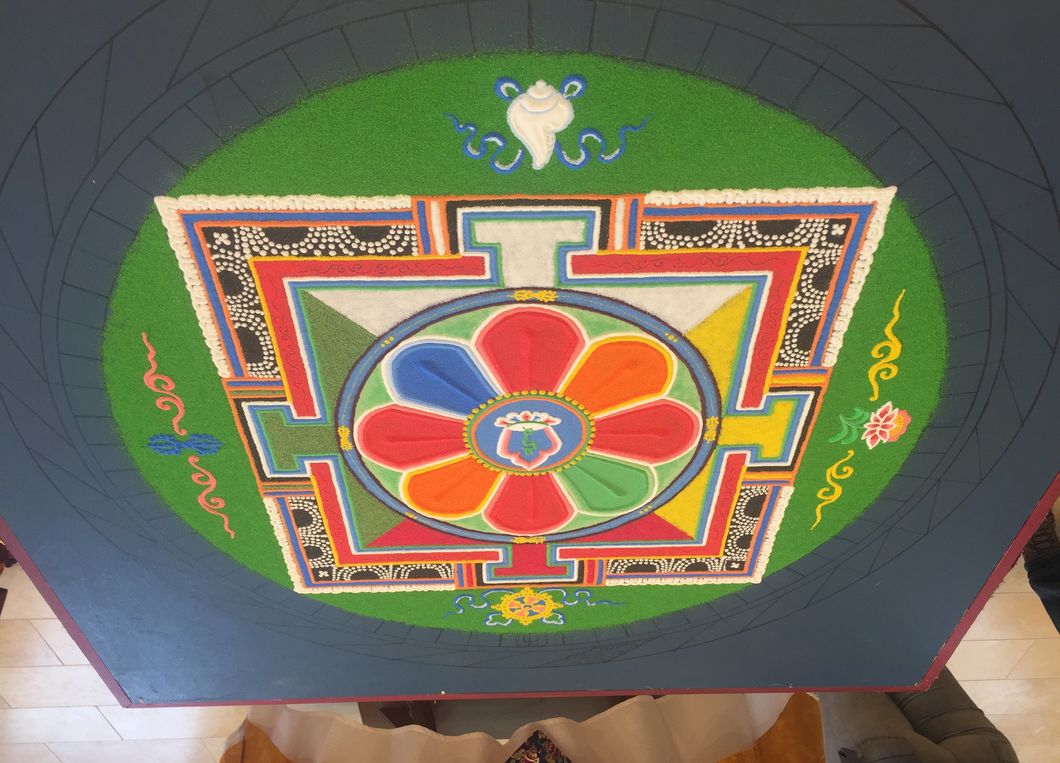What defines religion?
The definition of religion varies depending on who you ask.
The belief in and worship of a superhuman controlling power, especially a personal God or gods.
- Merriam Webster Dictionary
I came to see a Tibetan monk create a sand mandala in the Numen Lumen Pavilion. By definition, a sand mandala is a Tibetan Buddhist tradition involving the creation and destruction of mandalas made from colored sand. The mandala represents the wholeness and harmony at the heart of the Tibetan Buddhist universe. The mandala's purpose is to help transform ordinary minds into enlightened ones and to assist with healing. According to Buddhist scripture, mandalas constructed from sand transmit positive energies to the environment and to the people who view them. They are believed to effect purification and healing.
I sat down for lunch with the monk, and we had a deep conversation about his lifestyle and the practices and beliefs that he held. The one that struck me was when he said, "Religion is like tea, it provides color and flavor to the world, but you do not need it to live. However, ethics is like water, without it, we cannot survive." I would consider myself SBNR: spiritual but not religious. I align my personal belief set with that of Buddhists; however, I would not consider myself to be Buddhist.
Sand mandalas are an ancient, sacred form of Tibetan Buddhist art. The word mandala itself is a Sanskrit word meaning "circle." Throughout the walk to the dining hall and our meal, we spoke about his belief set and his life as a monk. We ate a vegetarian meal, but he told me that he does eat meat, while some others refuse to eat meat. He stated that there are two paths for those who both do and do not eat meat. In the mountains, where many Buddhist temples are, there is limited access to fresh produce, and meat is a consistent source of food, leading to many monks consuming them. Yet, other monks attempt not to eat meat when they travel, which can prove challenging as not all places offer other options.
The monk, who was named Geshe Sangpo, has wanted to be a monk since he was seven, and officially joined a monastery in 1985. Although he has four other brothers, only one decided to become a monk. As a college student, it is my job to figure out what I want to do with my life and discover where I want my career to take me. But Geshe has known all his life what he has wanted to do, and he aims to pursue happiness within his life. When I asked him about why he decided to be a monk, he told me that "There is nothing else I wanted to do. Being a monk has allowed me to be happy, where many other people are unhappy. It is hard to find happiness in life."
As I watched Geshe create the mandala, the stunning pattern and vibrant colors put me in awe. I asked about why the mandala would be destroyed after its completion, and the monks will dismantle the mandala sweep up the colors sand to symbolize the impermanence of all phenomena. It is meant to be a teaching that everything has a beginning, a middle, and an end.
It was truly enlightening for me to realize how deeply he believes in his religion and the beliefs and traditions that come along with it. I have never been particularly religious, and it gave me a new perspective on those who value religion as an integral part of their lives.























